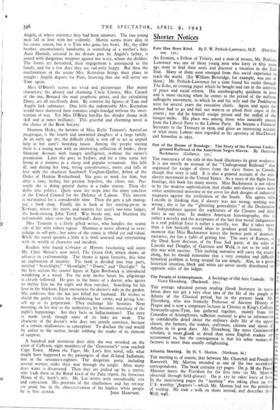Shorter Notices
Fate Has Been Kind. By F. W. Pethick-Lawrence, M.P. (Hutchinson. tss.) AN Etonian, a Fellow of Trinity, and a man of means, Mr. PethickLawrence was One of those young men who forty or fifty years ago went to find their souls and discover a vocation in the East End. Many of them soon emerged from this social experience to teach the world. (Sir William Beveridge, for example, was one of them.) Mr. Pethick-Lawrence for a time found his outlet through The Echo, an evening paper which he bought and ran in the interests of peace and social reform. His autobiography quickens in pace and is more exciting when he comes to the period of the militant suffragette movement, in which he and his wife and the Pankhursts were for several years the executive chiefs. Again and again the author had to go and bail out women or plead their care id the courts ; nor did he himself escape prison and the ordeal of the hunger-strike. His place was among those who naturally passed from the Liberal Party to the Labour Party. He became a Financial Secretary to the Treasury in 1929, and gives an interesting account of what many Labour men regarded as the apostasy of MacDonald and Snowden in 1931.
Out of the House of Bondage : The Story of the Famous Underground Railroad of the American Negro Slaves. By Henrietta Buckmaster. (Gollancz. iss.) THE inaccuracy of the title of this book illustrates its great weakness. It is not merely an account of the "Underground Railroad" that organised the escape of slaves from the slave States to Canada, though that story is told. It is also a general account of the antislavery movement in the United States. As a story of the flight from bondage,, this book has many merits. Miss Buckmaster is not taken in by the modern sophistication that thinks anti-slavery views were either sentimental nonsense or the cover for dark designs of industrial magnates against the civilisation of the South. She agrees with Lincoln in thinking that, if slavery was not wrong, nothing was wrong ; she is for the "glittering generalities" of the Declaration of Independence against the sophistries of the Choates and their heirs in our time. In modern American historiography, this is rather a novelty and the acceptance of the fact that moral indignation is a real political force is rather a novelty, too. But it takes more than a few basically sound ideas to produce good history. The moment that Miss Buckmaster leaves the beaten path of dramatic narrative, she has a habit of getting lost. The story of Kansas, of the Dred Scott decision, of the Free Soil party, of the roles of Lincoln and Douglas, of Garrison and Weld, is not to be told in this way with success. This rushing narrative will carry the, reader along, but he should remember that a very complex and difficult historical problem is being treated far too simply. Alas, in a given historical situation, black and white are never neatly distributed on opposite sides of the ledger.
The People of ArIstophanes. A Sociology of Old Attic Comedy. Victor Ehrenberg. (Blackwell. 25$.) THE average educated person reading Greek liteiature in translation does not get a very clear idea of the life of the people in Athens of the Classical period, but in the present book Mr. Ehrenberg, who was formerly, Professor of Ancient Histofy at Prague and is now a temporary lecturer in Classics at King's College, Newcastle-upon-Tyne, has gathered together, mainly from the Comedies of Aristophanes, sufficient material to give us information in considerable detail about the ordinary daily life of the upper classes, the farmers, the traders, craftsmen, citizens and slaves of Athens in its great days. Mr. Ehrenberg, like most Continental scholars, is more drank in detail than some English readers are accustomed to, but the consequence is that his sober matter-offactness is more than usually enlightening.
Atlantic Meeting. By H. V. Morton. (Methuen. 6s.)
THE meeting is, of course, that between Mr. Churchill and President Roosevelt. Mr. Morton attended as one of the two accredited correspondents. The book contains 157 pages. On p. 88 the Prime Minister meets the President for the first time (as Mr. Morton observed through field-glasses). On p. 122 he takes leave of him. In the intervening pages the "meeting" was taking place on the U.S. warship %Augusta '—which Mr. Morton had not the privilege o of visiting. He took a walk on shore instead, and describes that Well, wgll.
ht
Vi






















 Previous page
Previous page